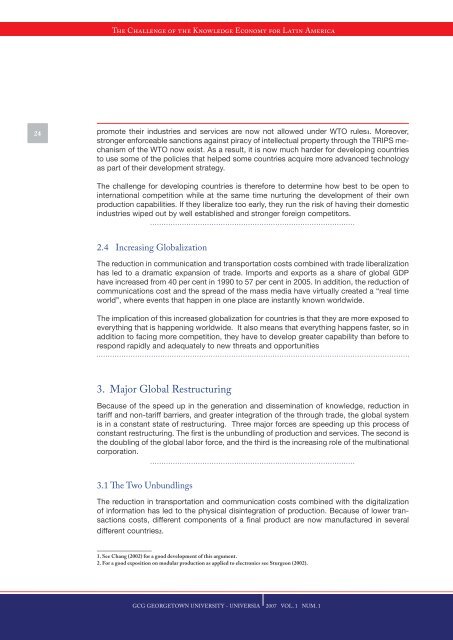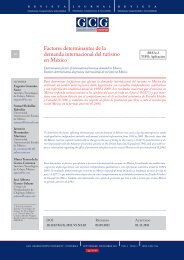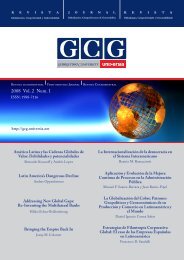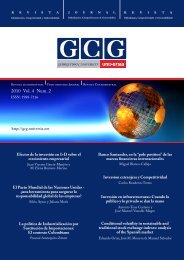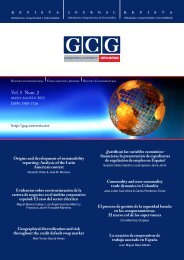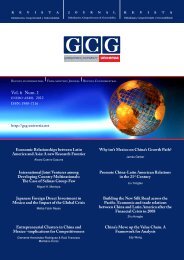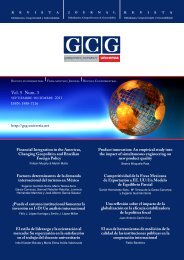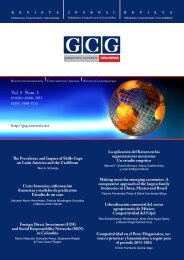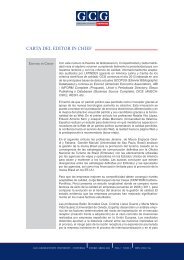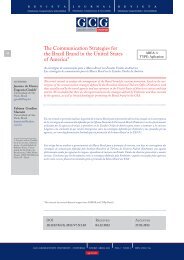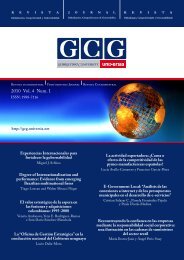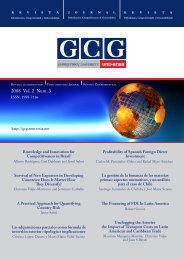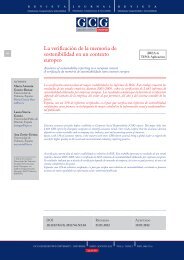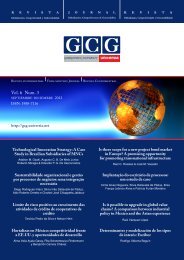2007 Vol. 1 Num. 1 - GCG: Revista de Globalización, Competitividad ...
2007 Vol. 1 Num. 1 - GCG: Revista de Globalización, Competitividad ...
2007 Vol. 1 Num. 1 - GCG: Revista de Globalización, Competitividad ...
You also want an ePaper? Increase the reach of your titles
YUMPU automatically turns print PDFs into web optimized ePapers that Google loves.
The Challenge of the Knowledge Economy for Latin America<br />
24 promote their industries and services are now not allowed un<strong>de</strong>r WTO rules1. Moreover,<br />
stronger enforceable sanctions against piracy of intellectual property through the TRIPS mechanism<br />
of the WTO now exist. As a result, it is now much har<strong>de</strong>r for <strong>de</strong>veloping countries<br />
to use some of the policies that helped some countries acquire more advanced technology<br />
as part of their <strong>de</strong>velopment strategy.<br />
The challenge for <strong>de</strong>veloping countries is therefore to <strong>de</strong>termine how best to be open to<br />
international competition while at the same time nurturing the <strong>de</strong>velopment of their own<br />
production capabilities. If they liberalize too early, they run the risk of having their domestic<br />
industries wiped out by well established and stronger foreign competitors.<br />
2.4 Increasing Globalization<br />
The reduction in communication and transportation costs combined with tra<strong>de</strong> liberalization<br />
has led to a dramatic expansion of tra<strong>de</strong>. Imports and exports as a share of global GDP<br />
have increased from 40 per cent in 1990 to 57 per cent in 2005. In addition, the reduction of<br />
communications cost and the spread of the mass media have virtually created a “real time<br />
world”, where events that happen in one place are instantly known worldwi<strong>de</strong>.<br />
The implication of this increased globalization for countries is that they are more exposed to<br />
everything that is happening worldwi<strong>de</strong>. It also means that everything happens faster, so in<br />
addition to facing more competition, they have to <strong>de</strong>velop greater capability than before to<br />
respond rapidly and a<strong>de</strong>quately to new threats and opportunities<br />
3. Major Global Restructuring<br />
Because of the speed up in the generation and dissemination of knowledge, reduction in<br />
tariff and non-tariff barriers, and greater integration of the through tra<strong>de</strong>, the global system<br />
is in a constant state of restructuring. Three major forces are speeding up this process of<br />
constant restructuring. The first is the unbundling of production and services. The second is<br />
the doubling of the global labor force, and the third is the increasing role of the multinational<br />
corporation.<br />
3.1 The Two Unbundlings<br />
The reduction in transportation and communication costs combined with the digitalization<br />
of information has led to the physical disintegration of production. Because of lower transactions<br />
costs, different components of a final product are now manufactured in several<br />
different countries2.<br />
1. See Chang (2002) for a good <strong>de</strong>velopment of this argument.<br />
2. For a good exposition on modular production as applied to electronics see Sturgeon (2002).<br />
<strong>GCG</strong> GEORGETOWN UNIVERSITY - UNIVERSIA <strong>2007</strong> VOL. 1 NUM. 1


